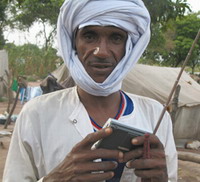EU force and UN police to help protect civilians in Chad and Central African Republic
According to the approved resolution a European Union force and U.N. police will help protect civilians in Chad and the Central African Republic caught in the spillover of the conflict in Darfur.

It authorizes the EU, under Chapter 7 of the U.N. Charter, which allows the use of military force, to deploy a force for one year in eastern Chad and northeastern Central African Republic. The force will help improve security, speed the delivery of humanitarian aid, and "contribute to protecting civilians in danger, particularly refugees and displaced persons."
The resolution also establishes a U.N. mission in both countries that will include international police, military liaison officers, and experts in human rights, civil affairs and the rule of law.
It will select and train a new unit of Chad's police and military police to maintain law and order in refugee camps, key towns and areas with large numbers of displaced civilians in eastern Chad. It will also coordinate with military and police authorities in Chad and a U.N. peacebuilding office in the Central African Republic.
At an open council meeting on peace in Africa Tuesday afternoon, U.S. President George W. Bush strongly supported the resolution and the mission.
"It's a step in the right direction. It's a practical solution to a big problem. It's a part of a grand solution," Bush said. "This U.N. mission's going to help national and local governments exercise sovereignty over their territory, it's going to allow workers to deliver humanitarian aid."
Italy's President Romano Prodi and Belgium's Prime Minister Guy Verhofstadt both pledged support for the EU force.
Chadian President Idriss Deby opposed Secretary-General Ban Ki-moon's original proposal for deployment of a U.N. military force but agreed to an EU force after meeting French Foreign Minister Bernard Kouchner in June. Deby reaffirmed his commitment to the EU force during a meeting with Ban earlier this month in Chad's capital, N'djamena.
With Deby's approval and a green light from the Security Council late last month that it would approve the deployment, the EU has started planning for a possible 3,000-strong peacekeeping mission.
The draft resolution calls for a maximum of 300 U.N. international police and 50 military liaison officers as well as "an appropriate number of civilian personnel."
The yearlong authorization for both the EU and the U.N. operations would take effect on the date the EU declares "its initial operating capability," in consultation with the secretary-general.
The resolution asks the secretary-general to report in six months on arrangements for following up the EU operation, "including a possible United Nations operation, depending on the developments in the situation." Before that date, it says, the EU and U.N. "shall perform an evaluation of needs."
The 4 1/2-year conflict in Darfur has spilled over into the northeast Central African Republic and eastern Chad, leading to a serious deterioration of security in the region.
France's U.N. Ambassador Jean-Maurice Ripert, who presided over the vote, said last month that there are now 400,000 refugees and internally displaced people in Chad, and more than 200,000 displaced people in the northern Central African Republic.
Since the Security Council visited Darfur and Chad in June 2006, the U.N. has been talking about deploying international police and troops to the two impoverished countries on the volatile border with Darfur.
The resolution expresses deep concern "at the activities of armed groups and other attacks in eastern Chad, the northeastern Central African Republic and western Sudan which threaten the security of the civilian population, the conduct of humanitarian operations in those areas and the stability of those countries, and which result in serious violations of human rights and international humanitarian law."
The Security Council reaffirmed "that any attempt at destabilization through violent means or seizing power by force is unacceptable," and it gave strong backing to efforts to improve relation among the three countries and restore peace in the region.
The U.N. is already pushing for the speedy deployment of a 26,000-strong joint African Union-U.N. peacekeeping mission in Darfur to replace a beleaguered 6,000-man AU force.
The Darfur conflict has killed more than 200,000 people and forced 2.5 million from their homes.
The conflict began when several groups of ethnic Africans rebelled against Sudan's Arab-dominated government in early 2003, accusing it of decades of neglect. The government allegedly retaliated by unleashing a militia of Arab nomads known as the janjaweed - a charge it denies.
Subscribe to Pravda.Ru Telegram channel, Facebook, RSS!


